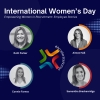International Women’s Day 2025: Empowering Women in Recruitment: Employee Stories

Ruth Parker – Director & Co-Owner, Alexander Associates
Can you share some details about your background and the path your career has taken up until now?
I started my career in recruitment 22 years ago, working my way up from Consultant to Divisional Manager before becoming a Director. Today, I am one of the owners of Alexander Associates. I am driven by a desire to be successful and to deliver a service to clients and candidates that was honest and ethical. Recruitment is about more than just placing people in jobs—it’s about building trust, creating meaningful opportunities, and making a genuine impact on people’s careers and businesses. Alongside my work in recruitment, I am a strong advocate for gender diversity and inclusion, particularly in engineering—a sector where representation is still evolving.
What’s your proudest achievement in your recruitment career so far?
One of my proudest achievements has been launching the #ShesAnEngineer campaign, which highlights the careers of inspiring women in engineering. Through this initiative, we’ve showcased the achievements of women in a traditionally male-dominated field, helping to change perceptions and encourage more young women to consider engineering careers. Additionally, making Alexander Associates a company with a 50% female board of directors has been a significant milestone, demonstrating that leadership roles in recruitment—and beyond—should be accessible to everyone, regardless of gender.
What challenges do you think women in the recruitment industry face, and what steps can we take to address them?
Despite many women excelling as recruitment consultants, leadership remains heavily male-dominated due to unclear career progression pathways, work-life balance challenges, industry biases, and a lack of female mentors and sponsors. Many agencies promote ‘top billers’ into leadership without structured management training, which can favour those who push aggressively for promotions rather than those with leadership potential. This creates a cycle where women, who may excel at relationship-building and strategic thinking, are overlooked in favour of those who fit a more traditional "sales-first" leadership model.
One of the biggest barriers is the informal networking and relationship-building practices that have historically favoured men. Many senior-level deals and promotions happen outside of the office—whether over drinks, in private networking groups, or on the golf course. I personally experienced this early in my career when clients would hold Golf Days, which I wasn’t invited to. These weren’t just social events; they were where key deals were done, relationships were strengthened, and strategic partnerships were formed. The exclusion of women from these spaces meant they weren’t part of those crucial, career-defining conversations, reinforcing the male-dominated leadership pipeline.
This "boys' club" culture still exists in some areas, making it harder for women to break through to business ownership and senior leadership. Unless recruitment businesses actively change these dynamics, women will continue to be at a disadvantage when it comes to leadership opportunities.
To remove these barriers, businesses need to:
- Create structured leadership pathways that value mentorship, strategic skills, and emotional intelligence, not just top billers.
- Normalise flexible leadership roles, making it easier for women balancing caregiving responsibilities to step into senior positions.
- Break the cycle of informal male networking by actively inviting women into decision-making spaces—whether that’s industry events, investment conversations, or leadership discussions.
- Encourage women to advocate for themselves and apply for leadership roles even if they don’t meet 100% of the criteria. Men apply when they meet 60%; women often wait until they meet every requirement.
- Ensure male leaders act as sponsors, actively championing talented women and bringing them into leadership discussions.
How can women in recruitment collaborate to offer support, mentorship, and encouragement to one another?
- Mentorship & Sponsorship – Women in leadership should not just mentor but actively sponsor other women—helping them gain visibility, get promotions, and take on leadership roles.
- Breaking Barriers in Networking – Women must build their own professional networks and ensure they are included in key industry discussions. If leadership conversations are happening on the golf course or in private networking groups, we need to create spaces where women are equally visible and influential.
- Advocating for Change in Company Culture – Senior women in recruitment must push for more inclusive leadership structures, ensuring leadership styles and promotions are based on merit, not outdated perceptions of what a leader should look like.
- Amplifying Each Other’s Voices – One of the most powerful ways women can support each other is by ensuring each other’s achievements are recognised. Too often, women downplay their successes—we should be promoting and celebrating each other at every opportunity.
- Encouraging Women to Take Risks – Many women hesitate to step into leadership or business ownership due to risk aversion. We need to encourage more women to embrace entrepreneurship, invest in themselves, and see leadership as an achievable goal.
Ultimately, true change happens when both men and women actively work to remove the barriers that have kept leadership so male-dominated for so long. If we shift the culture, normalise different leadership styles, and ensure women are part of key conversations and opportunities, we can create a more balanced and diverse recruitment industry.
Is there a female role model who has inspired you? Who is she, and what about her inspires you?
Dame Stephanie "Steve" Shirley – Tech Entrepreneur & Advocate for Women in Business
- She broke into the male-dominated tech industry in the 1960s, a time when women were rarely taken seriously in business.
- In 1962, she founded a software company, Freelance Programmers, which was one of the first businesses to focus on remote work, long before it became mainstream.
- To be taken seriously in a man's world, she signed her name as "Steve Shirley" in business letters—otherwise, men wouldn’t respond.
- She hired and championed women in tech, creating opportunities for female software engineers, many of whom were mothers who needed flexible working hours.
- Her company became hugely successful, winning contracts with major businesses and even working on software for the black box flight recorders used in airplanes.
- When she eventually sold the business, she made 70 of her employees’ millionaires, most of them women.
- Today, she is a philanthropist focusing on autism research, tech innovation, and women in STEM.
- She challenged gender norms in one of the most male-dominated industries.
- She was a true innovator in remote work, flexible careers, and women’s empowerment.
- She built a multi-million-pound business from scratch, proving that women entrepreneurs can thrive even in challenging environments.
- She gave back by supporting women and children through philanthropy.
If you were to offer advice to women working in recruitment and aiming for leadership roles, what would you say?
Own your ambition and be unapologetic about it. Too often, women hold back from putting themselves forward for leadership roles because they feel they need to be 100% qualified before stepping up. In reality, confidence and resilience are just as important as experience. Seek out mentors, advocate for yourself, and remember - you belong at the table.

Aimee Hall - Recruitment Consultant, Alexander Associates
Can you share some details about your background and the path your career has taken up until now?
I began my career as an office administrator at an Estate Agents, but after quickly reaching the limits of what the role could offer, I made the bold decision to transition into recruitment. I joined the Structural Engineering division at Alexander Associates, and with the guidance and support of my team, I quickly progressed from Trainee Recruitment Consultant to Consultant, where I moved into our new Space division to help drive its growth.
What’s your proudest achievement in your recruitment career so far?
The achievement I’m most proud of in my recruitment career is the way I’ve pushed myself outside of my comfort zone on a daily basis. From networking to public speaking, I’ve seen a remarkable boost in my confidence in this role. The messages I receive from satisfied candidates and clients make it all worthwhile.
What challenges do you think women in the recruitment industry face, and what steps can we take to address them?
One of the biggest challenges women in recruitment face is the gender bias and stereotypes about our capabilities, especially in male-dominated industries like engineering, where we are often underestimated.
How can women in recruitment collaborate to offer support, mentorship, and encouragement to one another?
It’s essential to have more female role models in the recruitment sector who can offer guidance on overcoming challenges and advancing in our careers. We need to work together to spread awareness of the bias and actively work toward creating a more diverse, educated and inclusive workforce.
Is there a female role model who has inspired you? Who is she, and what about her inspires you?
It may sound cliché, but my mum is undoubtedly my role model. From the very beginning, she was committed to raising me to be a strong, independent woman who advocates for herself and is not intimidated by the opinions of others. Her strength and compassion continue to inspire me, and I've learned that I am capable of far more than I ever thought possible.

Samantha Breckenridge - Head of Green Energy & Sustainability – Executive Search, Alexander Associates
Can you share some details about your background and the path your career has taken up until now?
I’m Samantha, and I currently lead the Green Energy and Sustainability Executive Search team at Alexander Associates. Our firm has a strong legacy in technical recruitment, and I’m thrilled to play a role in connecting top talent with opportunities in the growing green energy sector.
I began my career in 2007 within early years education, where I developed a passion for helping individuals grow and thrive. Following this, I started my degree in child psychology while continuing to work in the private schooling system. I later became the Manager of a startup nursery, hiring the entirety of the team. This journey led me to transition into education recruitment, where I refined my skills in matching the right talent to the right opportunities. In 2022, I took a career break to travel around South East Asia and Fiji, where I got my PADI certifications. It was an eye-opening experience, seeing diverse marine life up close and really understanding how important it is to protect our oceans and coral reefs. It’s something I’ve carried with me since.
After returning from my travels, I transitioned into executive search, specifically within strategy and corporate development, where I’ve honed my expertise in sourcing top-tier talent. Today, I’m excited to combine my recruitment skills with my passion for sustainability and marine life, helping to drive meaningful change in the green energy sector.
What’s your proudest achievement in your recruitment career so far?
My proudest achievement in recruitment has been the opportunity to work within the Green Energy and Sustainability sector, especially at such an exciting time. It's been amazing to see sustainability shift from a niche idea to something that’s now central to business and society. What really excites me is how sustainability today goes beyond just the environment, it’s about social responsibility, innovation, and building something that lasts.
Being part of an industry that’s shaping how we live and interact with the planet feels really meaningful. I’m inspired by people who are not only experts but who genuinely care about creating a more sustainable world. The progress we’ve made and the challenges still ahead keep me passionate about what I do, and I’m grateful to be part of something that aligns so closely with my own values.
What challenges do you think women in the recruitment industry face, and what steps can we take to address them?
Women in recruitment often face the challenge of balancing career growth with family responsibilities. While maternity and paternity leave, as well as support for surrogacy and adoption, have improved, many women still worry about losing touch with clients or falling behind on their desk when they take time off. That fear can make them hesitant to take full parental leave. To remove these barriers, we need to create stronger systems that allow women to maintain client relationships and offer more flexible return-to-work options, so they don’t feel like they’re sacrificing their career for their family.
The positive shift in how women’s leadership is viewed has helped as well. What was once considered too direct or forceful is now seen as confident, strong leadership. The traditional "boys' club" mentality is slowly being replaced with a focus on inclusivity and recognising the value of diverse leadership styles. With flexible working patterns, remote contracts, and an increased focus on work-life balance, recruitment has become a more supportive and sustainable career for women. There’s still work to do, but we’re definitely heading in the right direction to create a more supportive and sustainable career path for all women in the industry
How can women in recruitment collaborate to offer support, mentorship, and encouragement to one another?
Supporting other women within the recruitment sector starts with creating an environment of openness and collaboration. One key way to do this is by offering mentorship and sharing knowledge. It’s important for women to recognise and celebrate each other’s achievements, particularly in leadership roles. Offering guidance on navigating challenges, such as overcoming biases or dealing with industry pressures, helps create a space where women can thrive and feel empowered in their careers.
Another way to support one another is by championing diverse leadership styles. The recruitment industry is evolving, and it’s crucial to embrace the fact that women bring unique perspectives and strengths to leadership roles, whether it's emotional intelligence, strategic thinking, or a collaborative approach. By uplifting each other, recognising our collective potential, and continuing to challenge the traditional norms, we can create a stronger, more supportive environment where women are heard, valued, and given equal opportunities to succeed.
Is there a female role model who has inspired you? Who is she, and what about her inspires you?
My role model is undoubtedly my mum. Before my brother and I were born, she was a qualified nurse, a testament to her intelligence and her natural ability to care for others. She’s always been someone who can handle anything life throws at her. With my dad’s career in the Royal Navy, we moved around a lot- countless - and she was always there to keep everything together. She organised moving into our new homes, arranged our new schools, found new doctors, dentists and vets for the dogs. But what always stood out to me was how she made each new house feel like a home, no matter how many times we relocated. Moving so much has helped me build resilience and a deeper understanding of people and different cultures, something I truly believe I learned from her. She’s a remarkable woman, and I often find myself in awe of her strength, her creativeness, and her kindness. Family for us has always come first and her unwavering dedication to those she loves is something I deeply admire. I aspire to be like her every day, and I’m always touched when others notice the similarities between us. My mum has shown me what it means to be resilient, compassionate, and unapologetically yourself. She’s truly an icon in my eyes.

Connie Farnes - Recruitment Consultant, Alexander Associates
Can you share some details about your background and the path your career has taken up until now?
I joined Alexander Associates as a Resourcer in 2022, excited to take on a new challenge and grow within the recruitment industry. From the very beginning, I was eager to learn, and it didn’t take long for me to realize that my ambition extended beyond the Resourcer role. I wanted to develop my skills further and pursue a career as a Consultant. After months of hard work and learning from the experienced team around me, I achieved my goal and was promoted to Consultant shortly after returning from maternity leave. This was a significant milestone in my career, and it reaffirmed my commitment to growing and excelling in the recruitment field. Although I’m still early in my career, I’m incredibly excited for the future. I’m passionate about helping clients and candidates, building meaningful relationships, and continuing to develop my expertise.
What’s your proudest achievement in your recruitment career so far?
My proudest achievement in my career so far is the strong relationships I have built with existing clients, which have directly led to exclusive working opportunities. From the outset, I made it a priority to not only meet client expectations but to truly understand their unique needs and goals. By taking the time to listen, provide tailored solutions, and consistently deliver on promises, I’ve been able to foster trust and loyalty with those I work with. Over time, these relationships have evolved into more than just transactional connections; they’ve become long-term partnerships based on mutual respect and a shared commitment to success. As a result, I’ve been fortunate enough to secure exclusive working opportunities with clients, which has been incredibly rewarding.
What challenges do you think women in the recruitment industry face, and what steps can we take to address them?
Recruitment can be demanding, with high expectations, making it challenging for women who may face societal pressures related to caregiving and family responsibilities. While many companies are adopting flexible work policies, a stigma can still exist around taking time off for personal or family reasons. It's crucial for companies to support women’s return to the workplace by offering flexible work arrangements like remote working and flexible hours. I was fortunate to have this opportunity when returning from maternity leave, which allowed me to transition gradually back to full-time hours while continuing to pursue my career.
How can women in recruitment collaborate to offer support, mentorship, and encouragement to one another?
Women can support each other in the recruitment sector by offering mentorship, sharing knowledge, and advocating for career advancement opportunities. Creating networking events, promoting inclusivity, and acting as allies in the workplace helps build a collaborative environment where women can grow and succeed. By working together, women can ensure equal opportunities, provide guidance, and foster a supportive community within the industry.
Is there a female role model who has inspired you? Who is she, and what about her inspires you?
I feel incredibly fortunate to be surrounded by such inspiring women, including my daughter, who continuously motivate me. These women not only teach me valuable lessons but also serve as role models in various aspects of life. We all face different challenges as women, both personally and professionally. Whether it’s balancing career and family, overcoming societal expectations, or navigating workplace dynamics, women often encounter unique obstacles. However, I believe these challenges also provide opportunities for growth and connection, and I’m grateful for the women who inspire and support me along the way.





